Bunny Specialists: Key Players in Avian Health
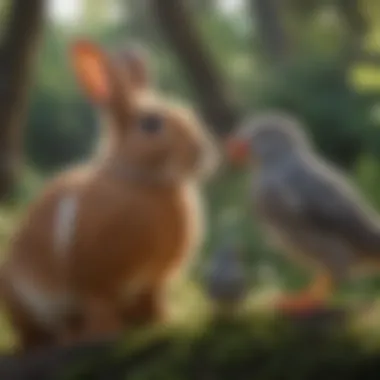
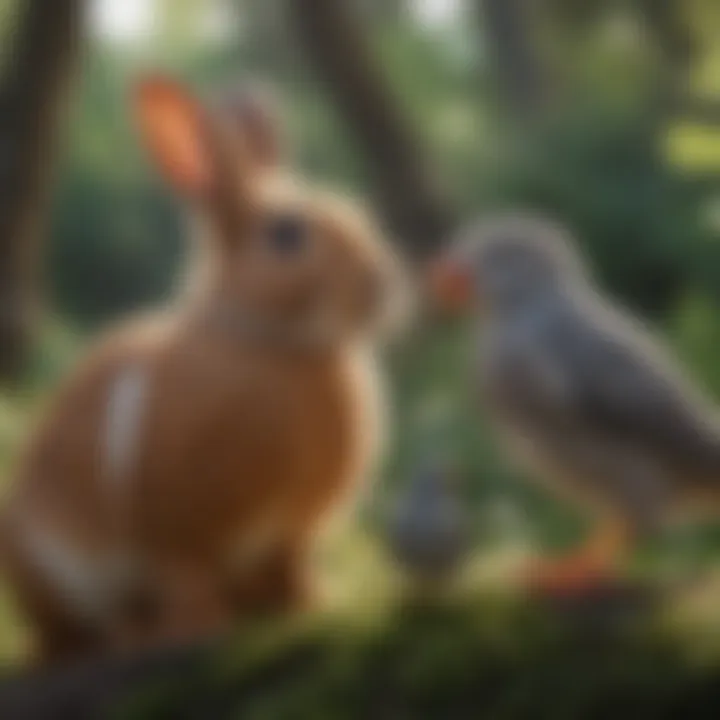
Intro
In exploring the world of avian care, one might initially assume that the focus lies solely on the needs of our feathered companions. Yet, there exists an intriguing intersection with bunny specialists whose expertise can be invaluable to bird owners. While rabbits and birds may seem worlds apart, the underlying themes of care and companionship bind their worlds together. This article will delve into how integral bunny specialists are in enhancing the well-being of pet birds, revealing the nuanced relationships and shared requirements that can transform both species’ lives.
Avian Care Basics
Importance of Proper Nutrition
Nutrition plays a critical role in the health of pet birds. Each species demands specific dietary elements, making it essential for owners to grasp these nuances. For instance, a parakeet's diet may heavily rely on seeds, while a cockatoo requires a variety of fruits, veggies, and a balanced pellet mix. Bunny specialists understand the finer details of nutrition not only for rabbits but also for birds. They often emphasize that similar dietary principles—like the importance of fresh ingredients and limited processed foods—apply across species. A bunny expert’s insights on hydration, especially through fresh veggies, can also benefit avian diets.
Understanding Bird Species and Their Needs
Knowing your bird isn't just about appreciating its colors and sounds. Each bird species comes with its unique quirks, social needs, and environmental requirements. A bunny specialist may provide perspective on how social interactions and companionship can impact avian behavior. For example, just as rabbits thrive in social settings, many birds do too. Intervention from someone with a background in bunny care can help pet owners better cater to their birds’ need for interaction and stimulation.
Basics of Birds Habitat Setup
The setup of a bird’s habitat is critical for its health and peace of mind. From cage size to the type of toys, every element matters. Bunny specialists often emphasize the importance of space and enrichment, principles very much applicable to avian care as well. Birds need their playtime and zones to explore, paralleling a rabbit's need for a safe play area. Taking cues from the bunnies’ world, bird habitats can be enhanced by integrating various heights for perches and natural elements like branches or safe plants to mimic an outdoor environment, thereby bringing out the natural instincts of both species.
Grooming and Hygiene Tips
Grooming isn't just for aesthetics; it’s a fundamental aspect of keeping our birds healthy. Techniques regarding feather maintenance and beak care can sometimes overlap with bunny grooming practices. Bunny specialists are well-versed in the importance of regular grooming to prevent health issues, a lesson equally valuable to avian caretakers. Proper bathing routines, regular check-ups for feather and skin condition, and ensuring nail trims are a part of both rabbit and bird care strategies. With practical advice from bunny experts, bird owners can enhance their grooming regimens to ensure their pets are both clean and content.
Interacting with Your Pet Bird
Building Trust and Connection
Establishing trust creates a solid foundation in the human-bird relationship. Insights from bunny specialists can shed light on how rabbits build trust, which can be mirrored in avian interactions. Slow movements, soft voices, and offering treats are all methods that can help birds feel secure in their surroundings.
Training Techniques and Tips
Training techniques enjoyed by rabbits often find their parallels in avian behavior. Bunny experts might highlight the effectiveness of positive reinforcement, a strategy also beneficial during bird training. Using food rewards or favorite toys creates motivation for birds to learn desired behaviors. Training provides mental stimulation and strengthens the bond between the bird and its owner, reinforcing trust and cooperation.
Fun Activities for Bird Owners and Their Birds
Birds, like bunnies, enjoy engaging activities that stimulate their minds. Bunny specialists can share unique play ideas that can be adapted for birds. For instance, creating obstacle courses or using foraging toys not only entertains birds but also encourages natural foraging behaviors—one more way to enrich their daily life.
Recognizing Bird Cues and Behaviors
Understanding a bird's language goes beyond chirps and squeaks. Bunny specialists can often draw parallels in behavior cues between rabbits and birds. For instance, a fluffed-up bird may indicate stress, similar to a rabbit's body language when it feels threatened. By paying close attention to these signals, owners can proactively manage stress and provide comfort, ensuring a happier pet.
Emotional Well-Being of Birds
The Role of Play and Socialization
Just like bunnies, birds require regular interaction and play to maintain their emotional health. Bunny specialists may advocate for social playtime among rabbits, underlining the significance of companionship, which translates perfectly into the avian realm. Birds thrive on social engagements, and neglecting this need can lead to behavioral issues.
Enhancing Birds' Emotional Health
The emotional needs of birds reflect the broad principles of animal welfare emphasized by bunny care. Providing enrichment, both physically and mentally, ensures birds stay happy and healthy. By addressing these emotional aspects, bunny specialists encourage owners to think outside the box—use of puzzles or interactive toys often adopted from rabbit care can keep a bird mentally stimulated.
Assessing Bird Stress and Remedies
Recognizing stress in birds is vital for their well-being. Bunny specialists often track signs of distress in rabbits and can help bird owners become more attuned to avian signals. Non-invasive remedies, like calming routines or adjusted playtimes, can alleviate stress. Awareness and responsiveness to these indicators underscore effective bird care.
Building Strong Human-Bird Bonds
Creating a solid bond with a pet bird requires patience and understanding. The same goes for bunnies. Lessons learned from the bunny community, like spending quality time or engaging in shared activities, can significantly enhance the relationship between birds and their owners.
Bird Health and Safety
Common Health Issues and Prevention
Understanding the common health issues that birds face is essential. Here, insights from bunny specialists can complement knowledge about avian health. Awareness of health concerns—such as respiratory issues or nutritional deficiencies—can stem from both fields, leading to a more holistic view of animal care.
Routine Veterinary Care
Routine check-ups are as vital for birds as they are for rabbits. Bunny specialists often stress the importance of preventive care, a principle that bird owners should closely consider. With proper veterinary care, many potential issues can be addressed before they become problematic.
Environmental Hazards to Avoid
Danger sometimes lurks in the most unsuspecting places. Just as bunny owners must safeguard against potential toxins, bird owners should be equally vigilant. Items like non-stick cookware and certain houseplants can pose risks to both species. Drawing on bunny care wisdom can help create a safer habitat for birds.
Signs of Illness or Distress
Recognizing the early signs of illness in birds can be tricky. Rabbit specialists have considerable experience with this, offering insights into general indicators that indicate a need for attention, such as changes in behavior or eating habits. Being attentive to these signs can dramatically improve outcomes for pet birds.
Fun Facts and Quirky Insights
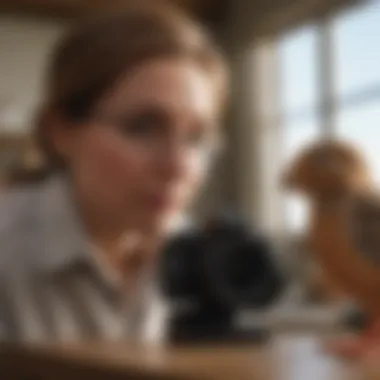
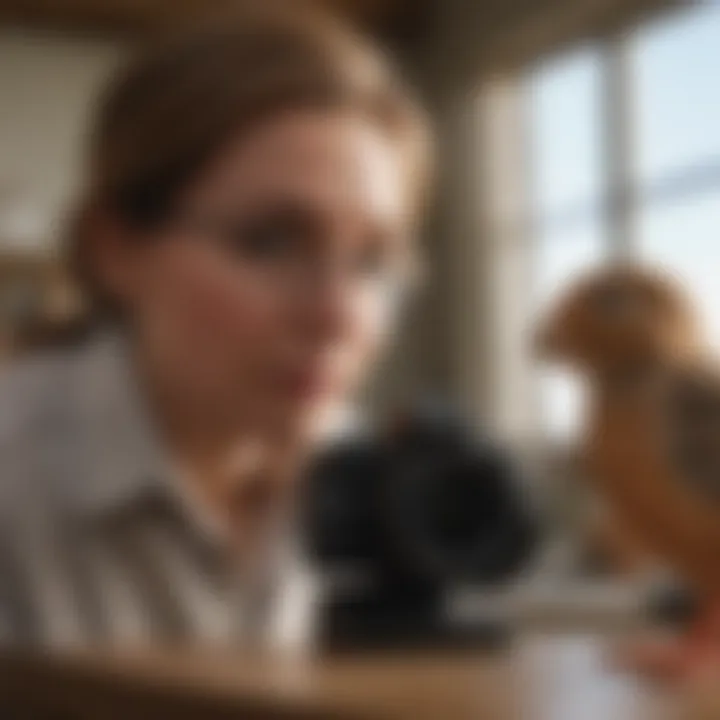
Unique Traits of Popular Bird Species
Birds exhibit a plethora of unique traits that often captivate their owners. From the vibrant plumage of macaws to the mimicking abilities of African Grey parrots, every species carries its charm. Drawing from the rabbit world, there’s an appreciation for quirks in behavior, making both realms fascinating.
Historical and Cultural Significance of Birds
Birds have long held significant cultural importance, often appearing in literature, art, and mythology. While rabbits too hold a place in folklore, avian symbolism spans across various cultures, shedding light on societal values and connections with nature.
Famous Bird Owners and Their Stories
Highlighting well-known personalities who have shared their lives with birds sheds light on the bonds we can form. From beloved entertainers to historical figures, stories about these birds often reflect the companionship they can bring, much like famous rabbit enthusiasts highlight their own cherished moments.
"Understanding the emotional and physical needs of both birds and bunnies reveals the parallels in compassion we owe to all creatures. Both species thrive under care that comprehensively appreciates their unique traits."
Through this detailed examination of the integral role bunny specialists play in avian care, it becomes clear that a collaborative approach benefits our feathered friends and those fuzzy companions we hold dear. Whether through shared knowledge, empathy for their needs, or a simple love for both species, caring for pets transcends the boundaries between species, fostering an enriching environment for all.
Prelude to the Roles of Bunny Specialists
In the ever-evolving landscape of pet care, the role of bunny specialists has come to light, especially in the realm of avian care. You might wonder how bunny specialists relate to birds. While on the surface, it seems like two entirely different worlds, the intertwined nature of their care presents a rich field for exploration. Understanding the significance of bunny specialists not only sheds light on their unique expertise but also emphasizes how their skills can substantially enhance the welfare of pet birds.
Bunny specialists bring a wealth of knowledge regarding animal behavior, environmental enrichment, and dietary management that can be pivotal for the well-being of avian companions. Their insights into the emotional and social needs of rabbits, for instance, can be translatable to birds, creating a more holistic approach to pet care. This intersection of expertise provides an avenue for pet owners to ensure that their feathered friends thrive alongside their furry counterparts.
Additionally, as we delve deeper into the interconnected needs of bunnies and avians - encompassing their habitat requirements, dietary essentials, and behavioral patterns - we see a tapestry woven with common threads of care. This exploration not only highlights the benefits of inviting bunny specialists into avian-friendly environments but also beckons the necessity for a more integrated approach to pet care.
"Understanding one animal often enhances the care of another, showcasing the versatile nature of animal husbandry."
The concept of cross-species care is gaining momentum. As pet owners increasingly seek out specialists who can cater to diverse needs, it becomes essential to recognize how bunny specialists can play a vital role in improving the quality of life for avian pets. Their involvement can pave the way toward innovative practices that bring out the best in both bunnies and birds, forming a community based on mutual understanding and shared welfare goals.
Thus, the introduction to the roles of bunny specialists not only serves as a foundational understanding of their work but also emphasizes the future possibilities that lie ahead in merging their practices with avian care. As we navigate through this article, expect a thought-provoking examination of how these experts can bridge the gap between differing species, lending their unique perspectives for the greater good of animal health.
The Intersection of Bunny and Avian Needs
The overlapping needs of bunnies and avian pets reveal a fascinating dynamic that can enhance the care of both species. Understanding this intersection is not only important for pet owners but also for those involved professionally in the areas of animal welfare and care. Bunny specialists bring unique insights into creating environments and care practices that appeal to the needs of both rabbits and birds, leading to enriched lives for all involved. Factors like habitat requirements, dietary provisions, and behavioral insights make this intersection a pivotal area of exploration.
Common Environmental Requirements
A critical look at the environmental needs showcases how bunnies and birds can thrive in harmoniously designed settings.
Habitat Adaptations
Adapting habitats that cater to both birds and rabbits is essential for fostering a healthy coexistence. One significant aspect of habitat adaptations is creating varied vertical and horizontal space that allows both species to roam and explore. For instance, installing multi-leveled platforms for birds with tunnels or hideaways for bunnies can create an engaging environment.
The key characteristic here is the vertical dimension, often overlooked in traditional pet habitats. It naturally provides enrichment and instills a sense of security for avians while satisfying the exploratory instincts of rabbits.
However, a challenge arises with the maintenance of such environments. Balancing the needs for cleaning and safety can demand constant adjustments, especially with different waste products. But the benefits outweigh these challenges, creating a dual-purpose space that feels adventurous yet safe for both bunnies and birds.
Space Considerations
When it comes to space considerations, understanding the spatial requirements for both species becomes crucial. Bunnies enjoy expansive areas to hop around, while birds need sufficient flying space. Both animals thrive in environments where they can exhibit their natural behaviors.
A key feature of these considerations is ensuring that the area is physically separated or divided in a manner conducive to each species' needs, yet still allows for visual contact. This communal setup fosters a good atmosphere where birds can chirp and bunnies can hop around, reducing stress and stimulating curiosity born from interaction.
The unique feature of the design is the flexibility in how the space can be configured. Whether it be through modular cages or outdoor aviaries that allow both species time outside, accommodating their needs can lead to reduced behavioral issues. However, if not properly managed, territorial disputes could arise, necessitating ongoing monitoring and possible adjustment of living arrangements.
Dietary Overlaps and Differences
Exploring the dietary needs of rabbits and birds delineates both their common ground and their distinct requirements.
Nutrition Essentials
Getting a grasp on nutrition essentials is critical in delivering the right care to both pets. A balanced diet for rabbits includes hay, which is essential for their digestive health, just as a variety of seeds and grains fulfills the avian diet. These shared elements of their diets highlight the importance of fiber and quality foods, which can further enhance the well-being of animals in a shared environment.
The key characteristic of nutrition essentials lies in their focus on fiber intake. High-fiber diets not only prevent potential health issues across species but also encourage foraging behavior, important for mental stimulation.
But, as beneficial as the overlaps are, they also present a unique challenge. The specificity of each species' nutritional demands means that a one-size-fits-all approach won't suffice. Therefore, caregiver awareness and precise feeding practices are fundamental, as mismatched diets can lead to problems like obesity or malnutrition.
Special Dietary Needs
In addition to general nutrition, understanding special dietary needs is equally important. Some birds, like parrots, may require certain fresh fruits or nuts that must be moderated due to their high-fat content. On the other hand, certain rabbit breeds might need a substantial amount of greens or specific pellets formulated for their size.
The relevance of special dietary needs is underscored by its specificity across different kinds of bunnies and birds. Tailoring diets to the individual characteristics of each pet fosters a holistic form of care that maximizes health benefits and minimizes risk.
Moreover, it's crucial to stay informed about potential toxic foods for both species. That’s another layer of complexity for caregivers in ensuring both pets thrive without risks. Such challenges, however, are manageable through regular consultations with veterinarian professionals and ongoing education, leading to better health outcomes in shared environments.
“Understanding the dietary and environmental needs of both bunnies and birds not only enriches their lives but also fosters an incredible bond that benefits caretakers too.”
Bunny Specialists’ Expertise in Behavioral Insights
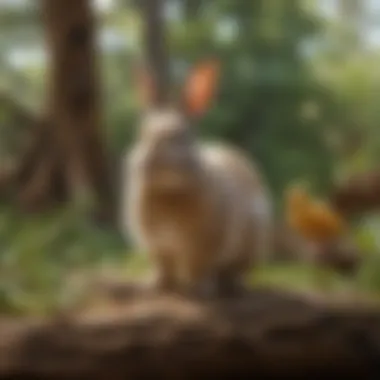
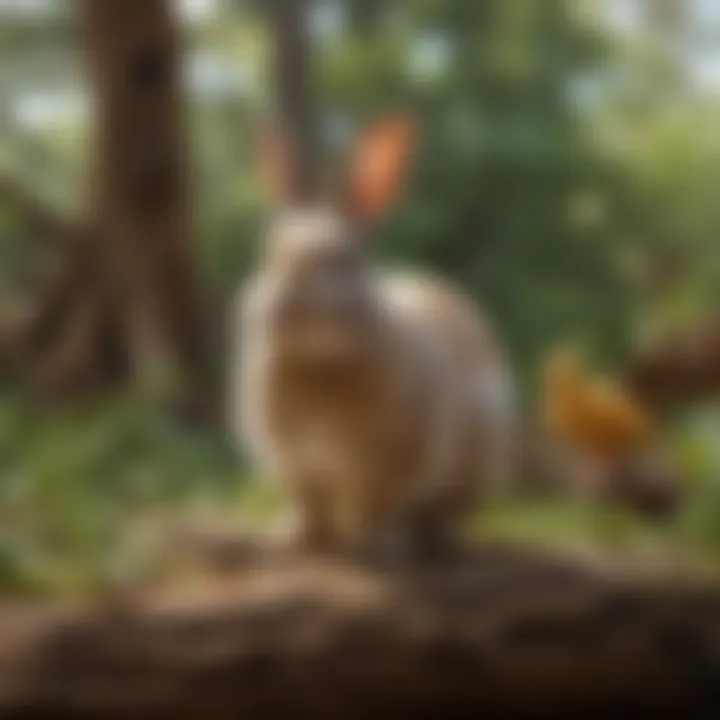
Bunny specialists hold a unique position in the realm of animal care, particularly in understanding and managing the behavior of avian companions. Their expertise goes beyond the basics of pet care; it delves deeply into the nuances of animal interactions, communication, and training. Integrating knowledge from the study of rabbits, bunny specialists can illuminate aspects of avian behavior that are crucial for enhancing the well-being of pet birds. This intersection of expertise can lead to more harmonious relationships between pet birds and their owners, as well as improve overall care strategies.
Understanding Animal Behavior
General Behavior Patterns
When it comes to general behavior patterns, it is crucial to recognize that both bunnies and birds have innate tendencies that dictate how they relate to their environment and each other. These patterns can range from social behaviors, such as flocking in birds or grooming in rabbits, to stress reactions when faced with unfamiliar situations. By understanding these behaviors, bunny specialists help bird owners become more aware of how their pets might react to everyday stimuli.
A key characteristic of these general behavior patterns is their predictability. Many pets showcase recognizable responses to common situations. For instance, both bunnies and birds may exhibit signs of anxiety when there are loud noises. This predictability makes it easier for caregivers to address potential issues before they escalate. Furthermore, recognizing behavior patterns allows specialists to suggest preventative measures, turning a potential crisis into a manageable situation which is essential in creating a stress-free environment.
Species-Specific Traits
Species-specific traits are equally important in offering insights into how different animals behave. Each species exhibits distinctive habits shaped by their biology and natural instincts. For example, parrots are known for their vocalizations, which play a significant role in their social structure. Conversely, bunnies rely heavily on body language to interact and communicate.
The highlight here is that these species-specific traits can be very informative. Knowing that a bird thrives when given opportunities to mimic sounds or explore items can guide owners in enriching their pets’ environment. However, there is also a downside; misunderstanding these traits can lead to negative outcomes, such as frustration on the part of the pet or caregiver. It's essential for animal caretakers to recognize these traits so that they can better support their pets’ unique needs.
Enrichment Techniques from Bunny Specialists
Cognitive Stimulation
Cognitive stimulation involves providing pets with activities that engage their minds and promote mental development. This approach is vital for both bunnies and birds, as it helps to alleviate boredom and encourages natural behaviors. Bunny specialists often recommend interactive toys or puzzle feeders that challenge pets to think and problem-solve.
The key feature of cognitive stimulation is its ability to mimic the challenges animals might face in the wild. By giving them tasks to complete, pets can experience satisfaction and fulfillment. However, it can be a double-edged sword; if the tasks are too difficult, they may lead to frustration instead of mental engagement. Thus, it's important to tailor activities to each pet’s abilities and preferences.
Physical Enrichment
Physical enrichment focuses more on the environment and the physical space that pets inhabit. For instance, ensuring birds have enough perches, toys to chew on, and areas to safely explore can significantly enhance their quality of life. Bunny specialists emphasize the need for engaging setups that encourage pets to be active and curious.
One key aspect of physical enrichment is the variety of stimuli it brings into a pet's life. A complex environment can promote exploration, exercise, and ultimately, happiness. However, some environmental changes may come with challenges; for instance, introducing new elements can lead to temporary stress until the pet adjusts. Thus, gradual changes and monitoring the pet's response are important.
"The role of bunny specialists in understanding both behavior and environment presents a unique advantage in providing comprehensive avian care."
Together, these facets of behavioral insight foster a deeper understanding of pet interaction and contribute significantly to the overall care strategy for birds. The collaboration between bunny specialists and bird owners can create a more enriching environment that meets the needs of pets both physically and mentally.
The Role of Animal Welfare in Avian Care
In the fascinating world of pet care, animal welfare plays an essential role, especially regarding the interactions between bunny specialists and avian care. While these two groups might seem separate at first glance, the reality is that animal welfare encompasses a broad range of considerations that directly influence the quality of life for birds. This section sheds light on the importance of animal welfare, focusing on the specific elements and benefits that arise from the integration of bunny specialists in avian care.
The well-being of avian creatures isn't just about meeting their basic needs—supporting their emotional and psychological health is equally essential. Bunny specialists, with their unique understanding of animal behavior and welfare, contribute significantly to avian well-being. Their methods often incorporate behavioral enrichment techniques that facilitate dynamic interactions, helping birds engage in natural behaviors, which is pivotal for their mental health.
When it comes to the welfare of any animal, knowledge is paramount. With specialized training in understanding the needs of lagomorphs, bunny specialists bring forth insights that can easily be adapted to avian care. It's about gaining a holistic outlook on what our feathered friends require—from tailored habitats that mimic their wild environments to a focus on their social needs. Understanding the nuance in behavior between species allows pet owners, breeders, and therapists to create conditions that truly nurture their animals.
"Knowledge isn't just power; it’s also compassion in action. A well-informed caregiver can ensure that pets, whether bunny or bird, thrive together."
Promoting Well-Being Through Knowledge
Promoting animal welfare means equipping pet bird owners with the right tools for informed care. Knowledge plays a central role in understanding how various factors influence wellbeing—everything from diet to social interaction can have monumental effects on an avian's quality of life. Through workshops and educational sessions, bunny specialists can convey information about not just the nutritional requirements of rabbits, but its parallel implications for birds.
For instance, both bunnies and birds thrive on a diverse diet rich in fresh vegetables and limited processed foods. Specialists can provide insights into how these dietary choices affect behavior and overall health, helping bird owners make informed decisions. Additionally, the enrichment techniques commonly used for bunnies—like tunnels, foraging trays, and social play—can easily be adapted for birds, promoting physical activity and mental stimulation.
Ethics of Cross-Species Care
The merging of bunny and avian care raises ethical considerations that are paramount in ensuring the welfare of both species. They both have their specific needs and characteristics that must not be overlooked. The ethical responsibility of caretakers and specialists is to ensure that interactions do not lead to stress or discomfort for any animal involved. This ethical dimension urges us to look beyond mere husbandry and consider the emotional landscape of both species.
Engaging in cross-species care calls for a thoughtful approach. It’s crucial to take into account factors like stress responses in both species when they are in each other’s proximity. Bunny specialists, trained in behavioral science, need to share their insights with avian care providers on potential triggers for anxiety or aggression. In doing so, they can advocate for practices that ensure both animals are respected, nurtured, and treated with dignity.
This ethical stance reinforces the idea that animal welfare truly extends beyond individual species. When animals coexist, fostering mutual respect can lead to improved outcomes for both parties involved, enriching their lives in ways that extend beyond simple survival.
Practical Applications in Avian Settings
The segment that delves into Practical Applications in Avian Settings reveals the significant impact bunny specialists have in enhancing the care of pet birds. This section unpacks the ways these animal care professionals can bridge the apparent divide between bunnies and birds, showcasing their influence through relevant programs and community initiatives. Practical applications are not just theoretical; they demonstrate real-world benefits that ultimately lead to improved conditions for both species.
Collaborative Workshops and Education
Training Sessions
Training sessions are a critical element in the collaboration between bunny specialists and avian care providers. These sessions serve as a platform where knowledge can be shared effectively. By emphasizing hands-on activity, participants learn not just about care techniques, but also about the emotional and psychological needs of birds and bunnies alike.
The key characteristic of training sessions is their interactive format—attendees engage directly with the animals while under the supervision of experienced bunny specialists. This setup creates a conducive environment for learning about behavioral cues that birds and bunnies exhibit. Not only are participants taught standard care practices, but they also get insight into the unique characteristics that define each species. This combination of theory and practice makes training sessions a beloved choice for enhancing overall animal care.
A unique feature of these training sessions is their capacity for customization. Each session can cater to the specific needs and interests of the attendees. This ensures that the learning experience is relevant to those involved, enhancing its effectiveness. On the downside, the success of these sessions can be contingent on the availability of specialists and the willingness of caregivers to actively participate—which can limit outreach.
Community Outreach
Moving beyond the confines of workshops, community outreach programs offer another vital facet of practical application. These programs focus on raising awareness among pet owners and the general public about the intersecting needs of birds and bunnies. By engaging with various communities, bunny specialists play an essential role in building knowledge bases that lead to better care practices.
Community outreach shines in its characteristic emphasis on inclusion and understanding. It allows for discussions that resonate beyond just owners of birds or bunnies—helping to establish a more informed public. Engaging the community not only benefits individual animals but raises the standard of care across the entire region.
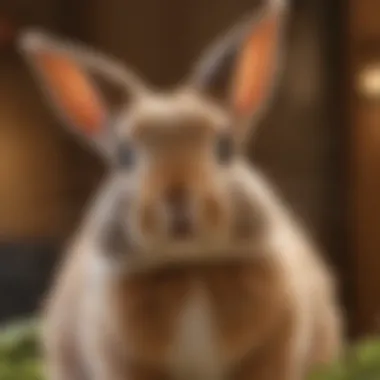
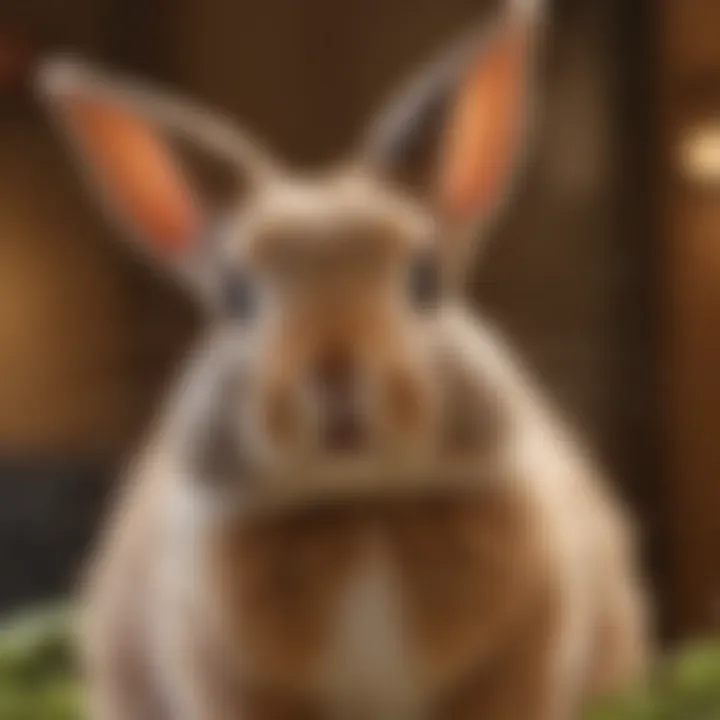
The unique feature of community outreach is its ability to foster partnerships with local shelters and community-based organizations, amplifying its message. However, one challenge is that these initiatives can require significant dedication and investment to maintain momentum. Sustaining community interest and support can sometimes prove difficult.
Case Studies of Effective Collaborations
Success Stories
Success stories from collaborative initiatives provide a roadmap for effective practices in avian care. These narratives often highlight instances where the integration of bunny specialists has markedly improved the welfare of birds, showcasing tangible results. Often, real-life examples illustrate the connection of shared habitats and dietary needs while dispelling common misconceptions.
A notable characteristic of these success stories is that they serve as potent illustrations of collaboration in action. Rather than merely chronicling what should happen, these cases encapsulate the benefits that ensue when professionals come together. This not only serves to inspire but also serves as a valuable teaching tool for others in the field. Each story often includes data or testimonials that flesh out the benefits, creating a compelling case for others to follow suit.
The unique feature of success stories lies in their relatability. When others see documented achievements, they find it motivating, which can spearhead further partnerships between specialists in various fields. The drawback, however, is that one success story does not always assure similar outcomes; the variables involved across different settings can be vastly different.
Lessons Learned
Lessons learned from previous collaborations offer critical insights into what works and what does not in avian care. They encourage reflection on both successes and failures, fostering an environment where continuous improvement is not just a goal but a practice. Understanding what didn’t go right in earlier efforts helps to inform future joint endeavors and avoids the pitfalls that others have encountered.
A defining trait of lessons learned is their educational value. They provide real feedback, revealing the nuances of design and implementation that theory alone might neglect. This acknowledgment of challenges in past efforts also creates a space for fostering resilience amongst practitioners.
The takeaway from documenting these lessons is essential; it builds collective knowledge that benefits the broader community involved in pet care. However, a potential downside is that focusing too much on negatives without offering concrete solutions can deter potential collaborators or followers from getting involved.
Challenges Faced by Bunny Specialists in Avian Care
Bunny specialists play an invaluable role in the care of both bunnies and birds. However, this important work isn't without its hurdles. Understanding these challenges is crucial for recognizing how bunny specialists can contribute effectively to avian care. Issues like cross-species perceptions, misconceptions about their roles, and a lack of resources often cloud the impact of these specialists.
Perceptions and Misconceptions
One major hurdle that bunny specialists encounter is the perception of their expertise. Many people think that caring for one species means a lack of knowledge about others. This widespread misconception can undermine the abilities of bunny specialists. For instance, someone might say, "How can a bunny expert help with a parrot?" The answer lies in recognizing the shared needs—both species thrive on environments rich in stimulation and appropriate dietary habits.
These perceptions often stem from a lack of awareness about the skills and knowledge that bunny specialists develop in areas like behavior, diet, and habitat. Dismissing their role in avian care prevents a more holistic understanding of animal well-being. Seeing the overlaps rather than the divisions can change how pet owners approach their animal care, effectively enhancing the lives of both birds and bunnies.
Resources and Support Structures
Another significant challenge bunny specialists face is the limited availability of resources and support structures. For many bunny specialists, connecting with avian care resources is less straightforward than it should be. Often, resources like community programs and educational materials focus mainly on birds or bunnies separately, rather than on bridging the gap between the two.
To illustrate, many pet owners may turn to online forums or social media groups to share their experiences. However, these platforms often reflect the same divide in knowledge and support, focusing on one species at the expense of the other. For instance, forums on platforms like Reddit that serve avian communities might not include bunny specialists, thereby losing the enriched conversation about combined animal care.
In addition to educational discrepancies, financial and logistical support can be hard to come by. Funding for workshops that target cross-species education may lag behind those centered solely on birds or rabbits. This lack of resources squelches collaboration opportunities that could otherwise enhance care practices for both pets.
As bunny specialists push against these barriers, the conversation around their role in avian care is beginning to shift slowly. More recognition of their skills within the context of bird care can only lead to a positive impact on pet health and happiness. Their knowledge base, if fully utilized, can lead to better support, better community education, and ultimately better outcomes for all involved.
The Future of Avian Care with Bunny Specialists
The intersection of bunny expertise and avian care is an emerging frontier in the world of pet management. As society's understanding of animal welfare evolves, the inclusion of bunny specialists in avian settings holds substantial promise. These professionals equip themselves with knowledge not just of their primary charges but of the broader spectrum of animal companionship, enriching the care of avian pets. The emphasis on integrated training programs, evolving roles, and the unique benefits this brings to pet owners and their birds cannot be overstated.
Innovations in Cross-Disciplinary Training
One of the key aspects shaping the future of avian care is the concept of cross-disciplinary training. This approach aims to break down the silos between different animal care professionals. Bunny specialists, with their focus on intricate behavioral patterns and environmental needs, deliver invaluable insight into managing avian companions. Here are some of the training innovations worth highlighting:
- Collaborative Learning Modules: Such modules foster an environment where bunny specialists and avian caregivers can share knowledge and techniques. Using role-playing scenarios or case studies, participants can simulate various cross-species interactions, gaining insight into how different species respond to similar stimuli.
- Workshops and Seminars: Organized sessions where bunny specialists educate avian caretakers about the behavioral overlaps between bunnies and birds can enhance the care these pets receive.
- Online Resources and Communities: Utilizing platforms like Reddit and Facebook to create networks of information exchange allows pet owners and professionals to stay updated on the developing synergies between the care of these two species.
"Understanding the behavioral threads that connect different species can often be the thread that ties an entire pet care approach together"
This kind of education not only bridges the gap between disparate areas of knowledge but also builds a community of animal lovers who are committed to the welfare of both bunnies and birds. As these training methods become more widespread, the relationship between pet owners and their feathered friends stands to flourish in ways not previously imagined.
Evolving Roles and Responsibilities
The presence of bunny specialists in avian care doesn't merely add another layer of expertise; it reshapes existing roles and responsibilities within the field. Just as bunnies have specific needs, so do birds. By understanding these dual needs, professionals can offer more holistic solutions. Some evolving roles include:
- Integrated Care Specialists: These practitioners could adopt a hybrid approach, integrating techniques from both fields into their daily procedures, leading to more effective care strategies.
- Behavioral Consultants: With deeper insight into behavioral cues from both bunnies and birds, these specialists can appropriately tailor interventions that consider both species’ instincts.
- Advocates for Resources: Bunny specialists can help identify tools and resources that serve both species, making care more accessible for pet owners. An emphasis on shared dietary knowledge, for instance, supports a balanced menu that is mutual.
- Community Leaders: Educating the public on the significance of understanding multi-species households promotes more efficient care practices, which ultimately leads to healthier pets.
In summary, the future of avian care intertwined with bunny expertise signals a paradigm shift—one that champions a deeper understanding of animal companions and their needs. As specialized knowledge from one realm enriches another, the overall health and happiness of both bunnies and birds have the potential to rise confidently.
Culmination: Integrating Knowledge for Holistic Care
When we consider the overall well-being of our feathered friends, it's evident that integrating the insights and expertise of bunny specialists holds significant value. Both bunnies and birds, despite their differences, thrive under conditions that cater to their unique but overlapping needs. This conclusion synthesizes our exploration of how a collaborative approach between these two areas of specialization not only enhances the lives of pet birds but also fosters a more profound understanding of animal welfare in general.
Reflecting on the Importance of Bunny Specialists
The role of bunny specialists goes beyond mere caretaking. They bring a wealth of knowledge about animal behavior, habitat requirements, and enrichment techniques that translate seamlessly into avian care. In practice, this means that the unique skills they possess can provide critical insights into the emotional and psychological needs of birds.
Pet birds often exhibit behaviors influenced by their environment. For instance, a bunny specialist might apply enrichment strategies they use with rabbits—like social interaction and environmental complexity—to the settings in which birds live. This could involve introducing toys that promote active engagement for birds or establishing communal spaces where pet birds can socialize safely. The practical implications of this expertise cannot be overstated:
- Enhanced Understanding of Interactions: Bunny specialists offer insights on how social bonding occurs in animals, aiding bird owners in interpreting their birds' behavioral cues.
- Holistic Care Approaches: Their knowledge encourages practices that consider both the physical and emotional aspects of pet care, leading to healthier animal dynamics.
- Bridging Skill Gaps: They can train bird owners in methods that incorporate stress reduction through familiar and proven animal care practices.
“Collaboration brings forth not just knowledge but a more holistic approach to caring for pets that can lead to happier, healthier animals.”
Future Directions for Research and Practice
The future landscape of avian care could become even richer with the continued involvement of bunny specialists. Research and practical implementations could focus on several key areas:
- Cross-Disciplinary Training Programs: Establishing courses that merge bunny care and avian care can create a new breed of animal care professionals, equipped with a wider perspective. This could involve specialized training sessions that explore both species' needs through hands-on workshops.
- Collaborative Studies: Future research could investigate the physiological and psychological impacts of shared environments. Studies evaluating how avian and bunny care techniques interact could guide best practices within the pet industry.
- Community Initiatives: Engaging local communities to promote awareness about the benefits of cross-species care can also play a role. Initiatives that include open discussions or resource-sharing platforms could lead to a larger audience benefiting from the wealth of knowledge available in both fields.
- Innovations in Behavioral Enrichment: Continuous development of new tools and methods based on existing behavioral studies could result in novel ways to enhance the lives of pets, focusing on creating environments that support complex behaviors.
In summary, the integration of knowledge derived from bunny specialists into avian care not only enriches the lives of birds but also promotes a broader understanding of animal welfare. As this relationship between fields evolves, it is crucial for pet bird owners, aspiring bird parents, and breeders to embrace these insights for the holistic well-being of their avian companions.















